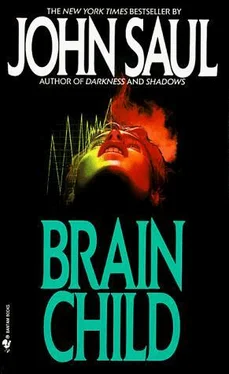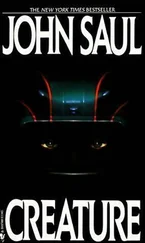John Saul - Brain Child
Здесь есть возможность читать онлайн «John Saul - Brain Child» весь текст электронной книги совершенно бесплатно (целиком полную версию без сокращений). В некоторых случаях можно слушать аудио, скачать через торрент в формате fb2 и присутствует краткое содержание. Год выпуска: 1985, ISBN: 1985, Издательство: Random House, Inc., Жанр: Ужасы и Мистика, на английском языке. Описание произведения, (предисловие) а так же отзывы посетителей доступны на портале библиотеки ЛибКат.
- Название:Brain Child
- Автор:
- Издательство:Random House, Inc.
- Жанр:
- Год:1985
- ISBN:978-0-30776793-6
- Рейтинг книги:5 / 5. Голосов: 1
-
Избранное:Добавить в избранное
- Отзывы:
-
Ваша оценка:
- 100
- 1
- 2
- 3
- 4
- 5
Brain Child: краткое содержание, описание и аннотация
Предлагаем к чтению аннотацию, описание, краткое содержание или предисловие (зависит от того, что написал сам автор книги «Brain Child»). Если вы не нашли необходимую информацию о книге — напишите в комментариях, мы постараемся отыскать её.
Brain Child — читать онлайн бесплатно полную книгу (весь текст) целиком
Ниже представлен текст книги, разбитый по страницам. Система сохранения места последней прочитанной страницы, позволяет с удобством читать онлайн бесплатно книгу «Brain Child», без необходимости каждый раз заново искать на чём Вы остановились. Поставьте закладку, и сможете в любой момент перейти на страницу, на которой закончили чтение.
Интервал:
Закладка:
Ellen’s eyes filled with tears, which she made no attempt to wipe away. “But he’s alive, Marsh,” she protested, and then shrank back in her chair as Marsh turned to face her.
“Is he? By what criteria? Let’s assume that what Torres says is true. That Alex’s brain was far too extensively damaged even to attempt repairs.” His eyes, flashing with anger, flicked to Torres. “That is what you said, isn’t it?”
Torres nodded. “There was no brain activity whatever, except on the most primitive level. His heart was beating, but that was all. Without the respirator, he couldn’t breathe, and as far as we could tell, he made no response to any sort of stimulation.”
“In other words, he was brain dead, with no hope of recovery?”
Again Torres nodded. “Not only was his brain dead, it was physically torn beyond repair. Which is the only reason I went ahead with the techniques I used.”
“Without our permission,” Marsh grated.
“With your permission,” Torres corrected. “The release clearly allowed me to use any methods I deemed necessary or fit, whether they were proven or unproven, traditional or experimental. And they worked.” He hesitated, then went on. “Perhaps I made a mistake,” he said. “Perhaps I should have declared Alex dead, and asked that his body be donated to science.”
“But isn’t that exactly what you did?” Marsh demanded, “Without, of course, the niceties of telling us what you were doing?”
Torres shook his head. “For the operation to be a complete success, I wanted there to be no question that Alex is still Alex. Had I declared him dead, what I have done would have led to certain questions I was not yet prepared to deal with.”
Suddenly Ellen rose to her feet. “Stop it! Just stop it!” Her eyes moved wildly from Marsh to Raymond Torres. “You’re talking about Alex as if he no longer exists!”
“In a way, Ellen,” Torres replied, “that’s exactly the truth. The Alex you knew doesn’t exist anymore. The only Alex that is real is the one I created.”
There was a sudden silence in the room, broken at last by Marsh’s voice, barely more than a whisper. “That you created with microprocessors? I still can’t believe it. It just isn’t possible.”
“But it is,” Torres said. “And it isn’t nearly as complicated as it sounds, except physically. It’s the connections that are the most difficult. Finding exactly the right neurons to connect to the leads of the microprocessors themselves. Fortunately, the brain itself is an aid there. Given an opportunity, it will build its own pathways and straighten out most of the human errors by itself.”
“But Alex is alive,” Ellen insisted. “He’s alive.”
“His body is alive,” Torres agreed. “And it’s kept alive by seventeen separate microprocessors, each of which is programmed to maintain and monitor the various physical systems of his body. Three of those microprocessors are concerned with nothing except the endocrine system, and four more handle the nervous system. Some of the systems are less complicated than those two, and could be lumped together in a single chip with a backup. Four of the chips are strictly memory. They were the easy ones.”
“Easy ones?” Ellen echoed, her voice weak.
Torres nodded. “This project has been under way for years, ever since I became interested in artificial intelligence — the concept of building a computer that can actually reason on its own, rather than simply make computations at an incredibly rapid speed. And the problem there is that despite all we know about the brain, we still have no real concept of how the process of original thought takes place. It very quickly became obvious to me that until we understood the process in the human brain, we couldn’t hope to duplicate it in a machine. And yet, we want machines that can think like people.”
“And you found the answer,” Marsh said, his voice tight.
Torres ignored his tone. “I found the answer. It seemed to me that since we couldn’t make a machine that could think like a man, perhaps we could create a man who could compute like a machine.
“A man with the memory capacity of a computer.
“The implication was obvious, and though the technology was not there ten years ago, it is today. The answer seemed to me to involve installing a high-capacity microprocessor inside the brain itself, giving the brain access to massive amounts of information, and enormous computational abilities, while the brain itself provides the reasoning circuits that are not yet feasible.”
“And did you do that?” Marsh asked.
Torres hesitated, then shook his head. “The risks seemed to me to be entirely too great, and the stakes too high. I had no idea what the results might be. That’s when I began work on the project of which Alex is the end result.” He smiled thinly. “It’s no accident that the Institute for the Human Brain is in the heart of Silicon Valley, you know. All our work is highly technical, and extremely expensive. And we have very little to show for it, despite all those articles out in the lobby.” Marsh seemed about to interrupt him, but Torres held up a restraining hand. “Let me finish. As I said, my work is highly technical, and very expensive, but this is one area of the country that has an abundance of money available to just such work. And so I took my proposed solution to the problem to certain companies and venture capitalists, and managed to intrigue them to the point where they have been willing to fund my research. And what my research has been, for the last ten years, is nothing more or less than reducing the monitoring and operation of every system in the human body to language a computer can understand, and then programming that information into microprocessors.”
“If it’s true,” Marsh breathed, “that’s quite incredible.”
“Not quite as incredible as it is useless,” Torres replied. “At first glance, it might seem quite marvelous, with all kinds of applications, but I’m afraid that isn’t the case. Usually, when a system goes bad in the human body, the dysfunction is caused by disease, not a failure of the brain. And good as my programs are, they can only function with healthy systems. What they don’t need is a healthy brain.
“You see,” he said quietly, “I decided years ago that I couldn’t experiment on someone who had a normal life ahead of him. I was only willing to work with a hopelessly brain-damaged case — someone who would unquestionably die unless I tried installing my processors — but whose body was basically intact. And that meant that the memory and computation chips wouldn’t be enough. So I spent ten years developing all the systems-maintenance programs as well.”
Raymond Torres opened the top drawer of his desk and pulled out a Lucite block, which he pushed across the desk to Marsh. “If you’re interested,” he said, “that block contains duplicates of the processors that are in Alex’s brain.”
Marsh picked up the block of Lucite — only a couple of inches on a side — and gazed into the transparent plastic. Floating in the apparent emptiness were several tiny specks, each no bigger than the head of a pin. “Those,” he heard Torres saying, “are the most powerful microprocessors available today. They’re a new technology, which I don’t pretend to understand, and they can operate perfectly on the tiny amount of current generated by the human body. Indeed, I’m told they require less electrical energy than the brain itself.”
Finally, as he stared at the tiny chips held prisoner in the lucite, Marsh began to believe what Raymond Torres had been telling him, and when he finally shifted his gaze to the other doctor, his eyes were brimming with tears.
Читать дальшеИнтервал:
Закладка:
Похожие книги на «Brain Child»
Представляем Вашему вниманию похожие книги на «Brain Child» списком для выбора. Мы отобрали схожую по названию и смыслу литературу в надежде предоставить читателям больше вариантов отыскать новые, интересные, ещё непрочитанные произведения.
Обсуждение, отзывы о книге «Brain Child» и просто собственные мнения читателей. Оставьте ваши комментарии, напишите, что Вы думаете о произведении, его смысле или главных героях. Укажите что конкретно понравилось, а что нет, и почему Вы так считаете.












